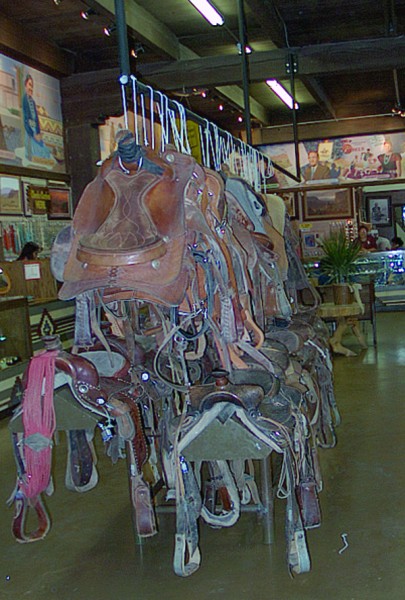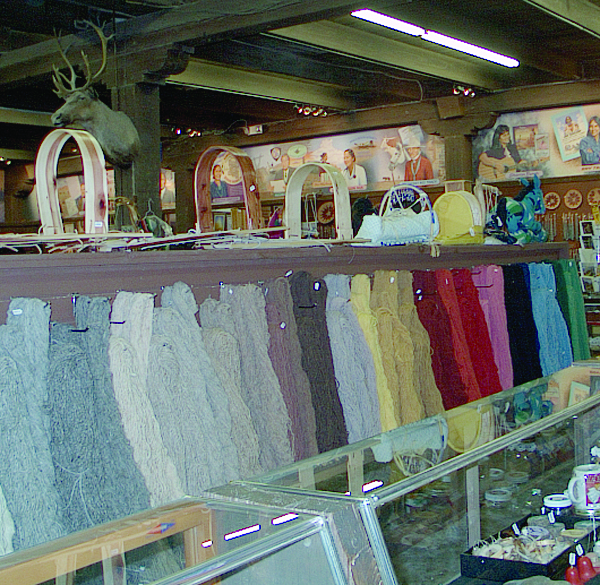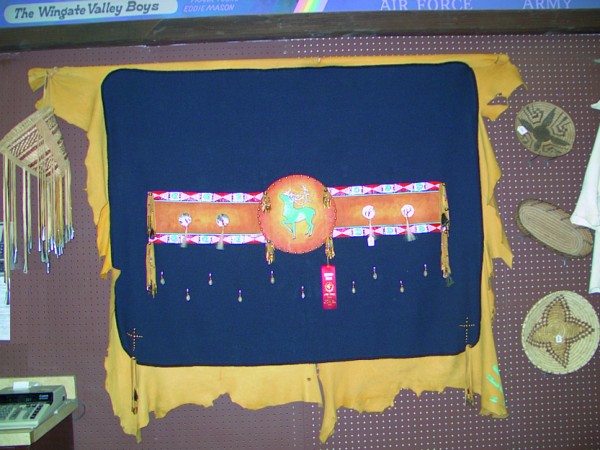Ellis Tanner Trading Post
Ellis Tanner, Trader
Story, photos, Kathryn R. Burke
Gallup, New Mexico
The post is large, over 15 thousand square feet, on a plot of 10 acres. It is one of the southwest’s largest, functional, traditional Indian trading posts and one of the world’s largest dealers in pawn and Indian arts and crafts in the country. The parking lot is filled with pickups, and those are filled with entire families, many of whom have driven for hundreds of miles. Inside, just past a row of worn saddles, customers, speaking a variety of languages, wait patiently on age-burnished wooden benches for their turn at the trade counter. Native American art lines the walls and fills glass cases. On the far side of the room, groceries and hardware items line well-stocked shelves. Near the center are cases of arts and craft supplies—pre-spun wools for weaving, Native American church supplies and a large selection of Pendleton blankets. Near the door is a case of tapes and CDs, all Native American music. And high overhead, circling the open front room of Ellis Tanner Trading Post is the “Circle of Light,” portrait-style paintings of Native Americans who have achieved success in various professions and serve as shining examples to the young people who might follow in their footsteps.
 Secure behind massive, painted doors that once stood in the old Bisbee, Ariz. copper mine, is the pawn room, filled with jewelry and other valuables. Another room is filled with pawn weavings. Yet another, houses pawn paintings and artwork. One holds saddles and bridles, stored for safekeeping between tourist trail riding seasons. While customers line up at the counter to buy, sell or trade, others bargain in the back with trader Ellis Tanner or his nephew Lynn Tanner, one selling Lynn his newly-flinted arrowheads from Oklahoma, another bringing Ellis his 100-plus year old collection of silver and turquoise jewelry for safe-keeping in the pawn room.
Secure behind massive, painted doors that once stood in the old Bisbee, Ariz. copper mine, is the pawn room, filled with jewelry and other valuables. Another room is filled with pawn weavings. Yet another, houses pawn paintings and artwork. One holds saddles and bridles, stored for safekeeping between tourist trail riding seasons. While customers line up at the counter to buy, sell or trade, others bargain in the back with trader Ellis Tanner or his nephew Lynn Tanner, one selling Lynn his newly-flinted arrowheads from Oklahoma, another bringing Ellis his 100-plus year old collection of silver and turquoise jewelry for safe-keeping in the pawn room.
The Tanner trading family began, like many others, with a Mormon Calling. Seth Tanner, great-grandfather to present-day, fourth generation trader Ellis, went west with Brigham Young when the Mormons settled Salt Lake City. “He was sent out to set up small Mormon colonies,” Ellis explains. “Each time he stayed a little longer. Finally, he set up a trading post in Tuba City (Ariz.) and he didn’t leave. The Navajos called him “Hosteen Shush” (Mr. Bear). We had a family reunion out there, in Tuba City, two or three years ago. They’re still using the same irrigation system today that he set up. Tanner Rapids, a tributary to the Grand Canyon, Tanner Wash, all that is named after Seth Tanner.
 “My grandfather, Joe Tanner (‘Shush Yazzae’ or Little Bear in Navajo) also became a trader in Tuba City. He was a very good friend of the Chairman of the Navajo Nation. Joe had a large family. Pretty soon we had several trading posts. Between my folks, the grand folks, my brothers, we’ve been all over the reservation with trading posts.
“My grandfather, Joe Tanner (‘Shush Yazzae’ or Little Bear in Navajo) also became a trader in Tuba City. He was a very good friend of the Chairman of the Navajo Nation. Joe had a large family. Pretty soon we had several trading posts. Between my folks, the grand folks, my brothers, we’ve been all over the reservation with trading posts.
“My father, Rule Levi Tanner was called ‘Duldin,’ in Navajo. It means ‘Little Man Hard to Get Along With.’ He had a big family. There were seven of us boys and one girl. All the boys became traders. There are four left now, three of us still active traders here in Gallup—me, Don at Shush Yaz, Joe at Joe Tanner Arts & Crafts. My oldest brother JB retired and lives in Farmington.”
Ellis, whose Navajo name is “A Ye Hee Yazzie” or “Little In Law” in Navajo, has a gallery in Silverton, Colo. as well as the larger, more traditional trading post in Gallup. His nephew Lynn, fifth generation trader and son of Ellis’ now-deceased brother Jerry (killed in a plane crash while inspecting his turquoise mines in Nevada) helps at both locations. Another nephew, Joe Tanner Jr., owns Fifth Generation Trading in Farmington.
“We were scattered all around the reservation when my dad died in 1957,” Ellis explains. “My mother went in with the older boys, JB and Don, and they started the Navajo Shopping Center in Gallup. It was the first business like that that let the Navajo go in and shop like we do today. JB revolutionized the Indian trading business.When he was a kid, JB used to run away from home and stay with different families. They’d send word he was there. Dad would say to keep him and put him to work. Consequently, JB is fluent in Navajo.”
Walk into Tanner Trading on any day, and you will see Ellis visiting with customers, the post bustling. You will hear Navajo, and maybe Zuni, Hopi, or even Ute or Apache. “Zuni is just up the road, but they come from long distances sometimes, to trade, to shop, maybe just to visit,” Ellis explains. “We still carry “just about everything—from food” (a new convenience store is under construction) “to—well, even to houses.” (Mobile homes can be purchased through a lessor on the property.) “We don’t carry feed and livestock anymore,” Ellis adds, “and we no longer have a slaughter house, but we do still have fresh mutton.” Ellis recalls when the pickups, filled with sheep ready for market, used to line up around the building and down the road. He used to buy 10 thousand head of sheep from the Navajo, shipped to markets further east, especially in Kansas, “but now,” he says, “the sheep population isn’t even 15 percent of what it was 15 to 20 years ago.”
 The biggest part of the business now is buying, selling and trading for Indian arts and crafts. His customers purchase materials for making them there, and often pawn or sell him the finished product. In the case of pawn, both old and newly made items, it is a way of cashing in without giving up possession of the item, a sort of revolving loan without all the complicated paperwork. “We are the bankers for the Navajo,” Ellis explains. “Their way of writing a check is to take off a bracelet and pawn it. New Mexico law says we can keep it four months before we sell it.” (Each state has different pawn laws.) “But we always keep it at least six months, sometimes for years. If they’re going through a hard time, we keep it for them. Only about one to one and a half percent of our pawn ever goes dead.” (Is not retrieved.)
The biggest part of the business now is buying, selling and trading for Indian arts and crafts. His customers purchase materials for making them there, and often pawn or sell him the finished product. In the case of pawn, both old and newly made items, it is a way of cashing in without giving up possession of the item, a sort of revolving loan without all the complicated paperwork. “We are the bankers for the Navajo,” Ellis explains. “Their way of writing a check is to take off a bracelet and pawn it. New Mexico law says we can keep it four months before we sell it.” (Each state has different pawn laws.) “But we always keep it at least six months, sometimes for years. If they’re going through a hard time, we keep it for them. Only about one to one and a half percent of our pawn ever goes dead.” (Is not retrieved.)
With the trading in arts and crafts and provision of other supplies and services including income tax preparation, Ellis Tanner Trading carries on a long-standing tradition. “I’m doing the same thing my father, grandfather and great-grandfather did before me,” Ellis says. “Our philosophy has been and will always be to sell to the Navajo, at a fair price, whatever they need and to buy from them, at a fair price, whatever they provide. We have a special responsibility to them.”
For Ellis, that responsibility is deeply personal. “We need to help preserve and protect cultural pride and tradition,” he believes. To that end, he sponsors (or co-sponsors) “Gallup Native American Appreciation Day,” held the first weekend of June. (See related “San Juan Silver Stage” article, fall 2000.) He provides behind-the-scenes financial backing to many Native American owned endeavors, from musical groups to community projects. His “Circle of Light” provides an example to young people. It is to the young people, of this and future generations, that Ellis most feels his historical responsibility. If they are to be inspired by example, then Ellis Tanner is truly an inspiration. “Hosteen Shush” can be proud of his great-grandson. Ellis has truly carried forward a great tradition.
Ellis Tanner Trading Co., corner Nizhoni & Highway 602, PO Box 636, Gallup, NM. 87305. 505 863-4434.
